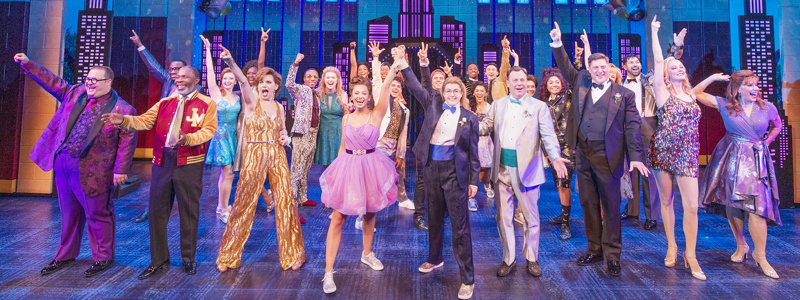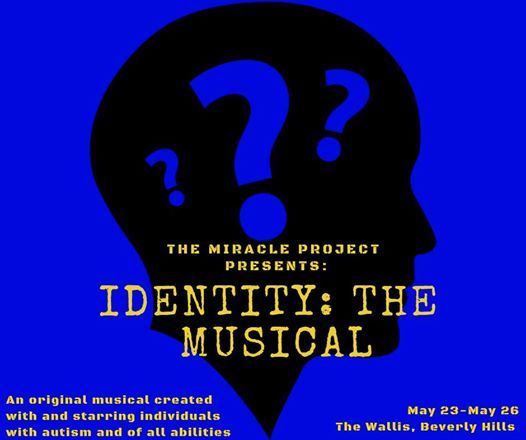“They sure don’t write ‘em like that any more!” Words often heard when people appreciate a revival of some old musical. It’s utter crap, of course, an inadvertent display of ignorance.
There’s a new musical on Broadway now that’s chock full of Golden Era virtues. It’s very funny, but it also has a hell of a lot of heart. It makes you feel good, and you also get to experience the giddy joy of a teenager getting to dance with a loved one at her prom. In the film world, the term “RomCom” is used disparagingly, as if there’s something unworthy about making an audience laugh and feel the feels. Call me old-fashioned, but I appreciate musicals that deliver these old-fashioned goods; a RomCom, well-done, is a great thing to be.
The Prom has music by Matthew Sklar, lyrics by Chad Beguelin, and book by Bob Martin and Beguelin, based on Jack Viertel’s inspiration, a decade ago, that there ought to be a show about a Midwestern high school banning gay couples from prom night. I wouldn’t call that a brilliant idea; in retrospect, it seems an obvious idea. But if you’re a writer wondering whether you have a good idea for a musical, think about the Sondheim canon. Bachelor observes friends’ marital squabbles; man with much younger virgin bride can’t quite connect with his mistress, revenge killer has an accomplice bake victims into pies; sickly ugly woman stalks a soldier. Premises, premises: I’m all through with premises premises now.
It’s how it’s handled. The Prom is rendered by experienced musical theatre writers who know a thing or two about time-tested craft. Sklar, Begulin and Martin wrote Elf, which I didn’t see, but I much admire their Broadway debuts: the songwriters did The Wedding Singer and Martin wrote book and starred in The Drowsy Chaperone. That hysterical love-letter to musical theatre nerds was the directing debut of Casey Nicholaw, who directed two musicals centering on high school girls last year, Mean Girls and The Prom. Without Sklar (my colleague at City Lights Youth Theatre), Begulin and Nicholaw have a monster hit in Aladdin. And now it seems like I’m just listing a lot of credits, but I’m thinking back to the Disney cartoon-to-stage adaptations that weren’t nearly as successful and surmise that these guys have some secret sauce that makes musical comedies successful.
In a different era, Casey Nicholaw would be a household name. If we venerated humor – and I believe we should – we might build a shrine to the master of making things funny. So, forgive me, more credits: Nicholaw choreographed Spamalot, an uproarious hit, and directed and choreographed The Book of Mormon and Something Rotten. The guy’s doing something right, and may hold the record for landing more jokes than any director alive.
Just last night a friend told me she knows all the songs in The Prom and I believe her. These strong and hummable tunes are put together well; they land their laughs and, when they need to, tug on the heart. A show-stopper called Zazz is so specifically crafted to chorine Angie Schworer’s amazing talents, it’s impossible to imagine anyone else doing it. Nicholaw here creates the rarest of things, a solo dance that actually provokes laughter.
But a good number of the numbers do this wonderful old school thing of playing up things the cast members do particularly well. So there’s that Drowsy Chaperone herself, Beth Leavel, ripping into a driving up-tempo that works both as a parody of what Leavel can do and an exemplar of it.
Similarly, Brooks Ashmanskas rips into a number that’s funny, fabulous and emotional. Too similarly, though, there’s Christopher Sieber. Nothing at all wrong with his performance, but somehow nobody noticed that his character is totally unnecessary, performing exactly the same function Ashmanskas performs in the show.
So that’s a qualm about The Prom. I thought it a very good musical. Glad I saw it, has a lot of heart. I don’t think The Prom is an excellent musical, though. There’s a level of predictability to the plot that might lead an East German judge to shave off a point on his card. And while the book and lyrics are very, very funny, I found myself wishing they were even more hysterical. Maybe three verys.
At times like this, I can’t avoid thinking about another Bob Martin creation, The Man In Chair. In The Drowsy Chaperone, he addresses the audience, conveying his enthusiasm for 1920s musicals with their creaky improbable plots and their shoehorned song cues. Then we see scenes from the show he’s describing, and it’s delightfully awful. Or wonderful. Or we’re meant to confront this confusion. Old musicals – awful, or wonderful? Both. There’s much that can be appreciated as well as much that’s disappeared with the era, like bathtub gin evaporating. (Does it even do that? I’ve never left a drop behind to see.)
So here, in the twenty-teens, we have a musical set in the twenty-teens, filled with the virtues and methods of musicals from the nineteen-fifties. Am I the only one who finds this odd, or ironic? Idea-generator Jack Viertel published a book a few years ago delineating things that make Golden Era musicals work. And The Prom, set in our time, seems not of our time. They sure do write ‘em like they used to! Would Man In Chair cheer?



 Posted by Noel Katz
Posted by Noel Katz 

